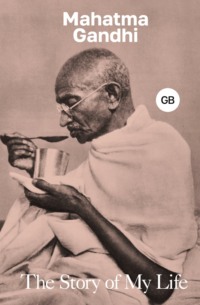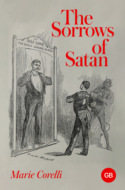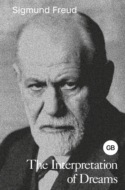Kitabı oku: «The Story of My Life / История моей жизни», sayfa 7
37. Kasturba's Courage
A medical friend once advised a surgical operation for my wife, to which she agreed after some hesitation. She was getting very thin, and the doctor had to perform the operation without chloroform. It was successful, but she had to suffer much pain. She, however, went through it with wonderful bravery. The doctor and his wife who nursed her were all attention. This was in Durban. The doctor gave me leave to go to Johannesburg, and told me not to have any anxiety about the patient.
In a few days, however, I received a letter to the effect that Kasturba was worse, too weak to sit up in bed, and had once become unconscious. The doctor knew that he might not, without my consent give her wines or meat. So he telephoned to me at Johannesburg for permission to give her beef tea. I replied saying that I could not grant the permission, but that, if she was in a condition to express her wish in the matter she might be consulted and she was free to do as she liked. “But,” said the doctor, “I refuse to consult the patient's wishes in the matter. You must come yourself. If you do not leave me free to prescribe whatever diet I like, I will not hold myself responsible for your wife's life.”
I took the train for Durban the same day, and met the doctor who quietly broke this news to me: “I had already given Mrs. Gandhi beef tea when I telephoned to you.”
“Now, doctor, I call this a fraud,” said I.
“No question of fraud in prescribing medicine or diet for a patient. In fact we doctors consider it a virtue to deceive patients or their relatives, if thereby we can save our patients,” said the doctor with determination.
I was deeply pained, but kept cool. The doctor was a good man and a personal friend. He and his wife had laid me under a debt of gratitude, but I was not prepared to put up with his medical morals.
“Doctor, tell me what you propose to do now. I would never allow my wife to be given meat or beef, even if the denial meant her death, unless of course she desired to take it.”
“You are welcome to your philosophy. I tell you that, so long as you keep your wife under my treatment, I must have the option to give her anything I wish. If you don't like this, I must regretfully ask you to remove her. I can't see her die under my roof.”
I think one of my sons was with me. He entirely agreed with me, and said his mother should not be given beef tea. I next spoke to Kasturba herself. She was really too weak to be consulted in this matter. But I thought it my painful duty to do so. I told her what had passed between the doctor and myself. She gave a firm reply: “I will not take beef tea. It is a rare thing in this world to be born as a human being, and I would far rather die in your arms than pollute my body with such abominations.”
I pleaded with her. I told her that she was not bound to follow me. I cited to her the instances of Hindu friends and acquaintances who had no scruples about taking meat or wine as medicine. But she was adamant. “No,” said she, “pray remove me at once.”
So we decided to leave the place at once. It was drizzling and the station was some distance. We had to take the train from Durban for Phoenix, whence our Settlement was reached by a road of two miles and a half. I was undoubtedly taking a very great risk, but I trusted in God, and proceeded with my task. I sent a messenger to Phoenix in advance, with a message to West to receive us at the station with a hammock, a bottle of hot milk and one of hot water, and six men to carry Kasturba in the hammock. I got a rickshaw to enable me to take her by the next available train, put her into it in that dangerous condition, and marched away.
Kasturba needed no cheering up. On the contrary, she comforted me, saying: “Nothing will happen to me. Don't worry.”
She was mere skin and bone, having had no nourishment for days. The station platform was very large and as the rickshaw could not be taken inside, one had to walk some distance before one could reach the train. So I carried her in my arms and put her into the compartment. From Phoenix we carried her in the hammock, and there she slowly picked up strength under water-cure treatment.
38. Domestic Satyagraha
Now it happened that Kasturba, who was well for a brief period after her operation, fell ill again. She had not much faith in my remedies, though she did not resist them. She certainly did not ask for outside help. So when all my remedies had failed, I entreated her to give up salt and pulses. She would not agree, however much I pleaded with her, supporting myself with authorities. At last she challenged me, saying that even I could not give up these articles if I was advised to do so. I was pained and equally delighted, – delighted in that I got an opportunity to shower my love on her. I said to her: “You are mistaken. If I was ailing and the doctor advised me to give up these or any other articles, I should unhesitatingly do so. But there! Without any medical advice, I give up salt and pulses for one year, whether you do so or not.”
She was rudely shocked and exclaimed in deep sorrow: “Pray forgive me. Knowing you, I should not have provoked you. I promise to go without these things, but for heaven's sake take back your vow. This is too hard on me.”
“It is very good for you to forego these articles. I have not the slightest doubt that you will be all the better without them. As for me, I cannot go back on a vow seriously taken. And it is sure to benefit me, for all restraint, whatever prompts it, is wholesome for men. You will therefore leave me alone. It will be a test for me, and a moral support to you in carrying out your resolve.”
So she gave me up. “You are too obstinate. You will listen to none,” she said, and sought relief in tears. I would like to count this incident as an instance of Satyagraha, and it is one of the sweetest recollections of my life.
After this Kasturba began to pick up quickly.
39. The advent of Satyagraha satyagraha
On return from duty in connection with the Zulu 'Rebellion' I met the friends at Phoenix and reached Johannesburg. Here I read with deep horror the draft Ordinance published in the Transvaal Government Gazette Extraordinary of August 22, 1906. It meant absolute ruin for Indians in South Africa.
Under it every Indian, man, woman or child of eight years or upwards, entitled to reside in the Transvaal, must register his or her name with the Registrar of Asiatics and take out a certificate of registration. The applicants for registration must surrender their old permits to the Registrar and state in their applications their name, residence, caste, age etc. The Registrar was to note down important marks of identification upon the applicant's person, and take his finger and thumb impressions. Every Indian who failed thus to apply for registration before a certain date was to give up his right of residence in the Transvaal. Failure to apply would be held to be an offence in law for which a person could be fined, sent to prison or even sent away from the country. Even a person walking on public thorough-fares could be required to produce his certificate. Police officers could enter private houses in order to inspect certificates. I have never known legislation of this nature being directed against free men in any part of the world.
The next day there was held a small meeting of the leading Indians to whom I explained the Ordinance word by word. It shocked them as it had shocked me. All present realized the seriousness of the situation and resolved to hold a public meeting.
The meeting was duly held on September 11, 1906. The most important among the resolutions passed by the meeting was the famous Fourth Resolution, by which the Indians solemnly determined not to submit to the Ordinance in the event of its becoming law in the teeth of their opposition, and to suffer all the penalties attaching to such non-submission.
None of us knew what name to give to our movement. Shri Maganlal Gandhi suggested the word 'Sadagraha' meaning 'firmness in a good cause'. I liked the word, but it did not fully represent the whole idea I wished it to convey. I therefore corrected it to 'Satyagraha'. Truth (satya) implies love, and firmness (agraha) brings about and therefore serves as a synonym for force. I thus began to call the Indian movement 'Satyagraha', that is to say, the force which is born of Truth and Love or non-violence, and gave up the use of the phrase 'passive resistance', in connection with it.
40. Imprisonment
The officers of the Asiatic Department came to think the strength of the movement could not by any means be broken so long as certain leaders were at large. So they arrested some of us. The community had resolved to fill up the jail after our arrests. We had been in jail for a fortnight, when fresh arrivals brought the news that there were going on some negotiations about a compromise with the Government. The substance of the proposed settlement was that the Indians should register voluntarily and that if the majority of the Indians underwent voluntary registration, Government should repeal the Black Act, as the Asiatic Registration Act came to be called.
I was taken to Pretoria to meet General Smuts and after discussion with him of an amendment I had suggested, the draft settlement was accepted. The prisoners were released and I went about explaining the terms of the settlement to my countrymen.
41. Assault
A couple of Pathans were angry with me for consenting to the giving of finger-prints. It had been agreed that the leaders should be the first to take out certificates on the first day. When I reached my office, which was also the office of the Satyagraha Association, I found Mir Alam, a Pathan, and his companions standing outside the premises. Mir Alam was an old client of mine, and used to seek my advice in all his affairs. He was fully six feet in height and of a large and powerful build. Today for the first time I saw Mir Alam outside my office instead of inside it, and although his eyes met mine, he for the first time did not salute me. I saluted him and he saluted me in return. But he did not today wear his usual smile. I noticed his angry eyes and took a mental note of the fact. I thought that something was going to happen. The Chairman, Mr. Yusuf Mian and other friends arrived, and we set out for the Asiatic Office; Mir Alam and his companions followed us.
As we were not more than three minutes' walk from the Registration Office, Mir Alam came up to me and asked me, “Where are you going?”
“I propose to take out a certificate of registration, giving the ten finger-prints.” I replied. “If you will go with me, I will first get you a certificate with an impression only of the two thumbs, and then I will take one for myself, giving the finger-prints.” I had scarcely finished the last sentence when a heavy cudgel blow descended on my head from behind. I at once fainted with the words He Rama (O God!) on my lips, lay flat on the ground and had no notion of what followed. But Mir Alam and his companions gave me more blows and kicks, some of which were warded off by Yusuf Mian and Thambi Naidoo with the result that they too were beaten in their turn. The noise attracted some European passers-by to the scene. Mir Alam and his companions fled but were caught by the Europeans. The police arrived in the meanwhile and took them away. I was picked up and carried into Mr. J. C. Gibson's private office. When I regained consciousness, I saw Mr. Doke bending over me. “How do you feel?” he asked me.
“I am all right,” I replied, “but there is pain in the teeth and the ribs. Where is Mir Alam?”
“He has been arrested along with the rest.”
“They should be released.”
“That is all very well. But here you are in a stranger's office with your lip and cheek badly torn. The police are ready to take you to the hospital, but if you will go to my place, Mrs. Doke and I will look after you as best we can.” “Yes, please take me to your place. Thank the police for their offer but tell them that I prefer to go with you.” Mr. Chamney, the Registrar of Asiatic, too now arrived on the scene. I was taken in a carriage to this good clergy-man's residence in Smit Street and a doctor was called in. Meanwhile I said to Mr. Chamney: “I wished to come to your office, give ten finger-prints and take out the first certificate of registration, but God willed it otherwise. However I have now to request you to bring the papers and allow me to register at once. I hope that you will not let anyone else register before me.” “Where is the hurry about it?” asked Mr. Chamney. “The doctor will be here soon. You please rest yourself and all will be well. I will issue certificate to others but keep your name at the head of the list.” “Not so,” I replied. “I am pledged to take out the first certificate if I am alive and if it is acceptable to God. It is therefore that I insist upon the papers being brought here and now.”
Upon this Mr. Chamney went away to bring the papers. The second thing for me to do was to write to the Attorney-General that I did not hold Mir Alam and others guilty for the assault committed upon me, that in any case I did not wish them to be prosecuted and that I hoped they would be let off for my sake. But the Europeans of Johannesburg addressed a strong letter to the Attorney General saying that whatever views Gandhi might hold as regards the punishment of criminals, they could not be given effect to in South Africa. Gandhi himself might not take any steps, but the assault was committed not in a private place but on the high roads and was therefore public offence. Several Englishmen too were in a position to tender evidence and the offenders must be prosecuted. Upon this the Attorney-General rearrested Mir Alam and one of his companions who were sentenced to three months' hard labour. Only I was not summoned as a witness. I addressed a short note as follows to the community through the Chairman and sent it for publication:
“I am well in the brotherly and sisterly hands of Mr. and Mrs. Doke. I hope to take up my duty shortly.
“Those who have committed the act did not know what they were doing. They thought that I was doing what was wrong. They have had their revenge in the only manner they know. I therefore request that no steps be taken against them.”
Mr. Chamney returned with the papers and I gave my finger-prints but not without pain. I then saw that tears stood in Mr. Chamney's eyes. I had often to write bitterly against him, but this showed me how man's heart may be softened by events.
42. Resumption of Satyagraha
The Indians had registered voluntarily. The Government were, therefore, on their part to repeal the Black Act. But instead of repealing the Black Act, General Smuts maintained the Black Act on the statute book and introduced into the legislature a measure, 'making further provision for the registration of Asiatics': I was shocked when I read the Bill. An 'Ultimatum' was sent to the Government by the Satyagrahis. It said in effect, “If the Asiatic Act is not repealed, the certificates collected by the Indians would be burnt, and they would humbly but firmly take the consequences.” A meeting had been called to perform the public ceremony of burning the certificates. As the business of the meeting was about to commence, a volunteer arrived on a cycle with a telegram from the Government in which they regretted the determination of the Indian community and announced their inability to change their line of action. The telegram was read to the audience which received it with cheers, as if they were glad that the auspicious opportunity of burning the certificates did not after all slip out of their hands.
Mir Alam too was present at this meeting. He announced that he had done wrong to assault me as he did, and to the great joy of the audience, handed his original certificate to be burnt, as he had not taken a voluntary certificate. I took hold of his hand, pressed it with joy, and assured him once more that I had never had in my mind any resentment against him. The Committee had already received upwards of 2,000 certificates to be burnt. These were all thrown into the fire, soaked with kerosene oil and set ablaze by Mr. Yusuf Mian. The whole assembly rose to their feet and made the place resound with the echoes of their continuous cheers during the burning process. Some of those who had still withheld their certificates brought them in numbers to the platform, and these too were thrown to the flames. The reporters of English newspapers present at the meeting were profoundly impressed with the whole scene and gave vivid descriptions of the meeting in their papers.
During the same year in which the Black Act was passed General Smuts carried through the Legislature another Bill called the Transvaal Immigrants Restriction Bill. This Act indirectly prevented the entry of a single Indian newcomer into the Transvaal.
It was absolutely essential for the Indians to resist this fresh inroad on their rights. Several Satyagrahis therefore deliberately entered the Transvaal and were imprisoned. I too was arrested again. Gokhale came to South Africa in October 1912 to mediate between the Satyagrahis and the Government. General Botha, according to Gokhale, promised him that the Black Act would be repealed in a year and the £ 3 tax abolished. But this was not done. I wrote to Gokhale about the breach of the pledge and set about making preparations for the ensuing campaign.
Till now we had dissuaded women from courting imprisonment. But at this time judgement was passed by the South African Government which made invalid all marriages that had not been celebrated according to Christian rites and registered by the Registrar of Marriages. Thus at a stroke of the pen all marriages celebrated according to Hindu, Mussalman and Zoroastrian rites became illegal, and the wives concerned were degraded to the rank of concubines and their children deprived of the right to inherit property. This was an unbearable situation for women no less than men.
Patience was impossible in the place of this insult offered to our womanhood. We decided to offer stubborn Satyagraha irrespective of the number of fighters. Not only could the women now be not prevented from joining the struggle, but we decided even to invite them to come into line along with the men.
The women's imprisonment worked like a charm upon the labourers on the mines near Newcastle who downed their tools and entered the city in succeeding batches. As soon as I received the news, I left Phoenix for Newcastle. The labourers were not to be counted by tens but by hundreds. And their number might easily swell into thousands. How was I to house and feed this ever growing multitude? There was a huge gathering of men, which was continuously increasing. It was a dangerous if not an impossible task to keep them in one place and look after them while they had no employment. I thought out a solution of my problem. I must take this 'army' to the Transvaal and see them safely deposited in jail. The strength of the 'army' was about five thousand.
43. The triumph of Satyagraha
The Union Government had not the power to keep thousands of innocent men in jail. The Viceroy would not tolerate it, and all the world was waiting to see what General Smuts would do. The Union Government now did what all governments similarly situated generally do. They get out of such awkward position by appointing a commission. It is a general practice that the recommendations of such a commission should be accepted by the State, and therefore under the guise of carrying out the recommendations, governments give the justice which they have first refused. General Smuts appointed a commission of three members. I entered into correspondence with General Smuts over the work of the commission and came to agreement. The commission in its report recommended acceptance of the demands of the Indian community; and within a short time after the issue of the report, the Government published in the official Gazette of the Union the Indians' Relief Bill which abolished the £ 3 tax, made legal all marriages deemed legal in India, and made a domicile certificate bearing the holder's thumb-print sufficient evidence of the right to enter the Union.
Thus the great Satyagraha struggle closed after eight years, and it appeared that the Indians in South Africa were now at peace. On July 18, 1914, I sailed for England on my way back to India. It was difficult for me to leave South Africa, where I had passed twenty-one years of my life sharing to the full in the sweets and bitters of human experience and where I had realized my calling in life.
Ücretsiz ön izlemeyi tamamladınız.








